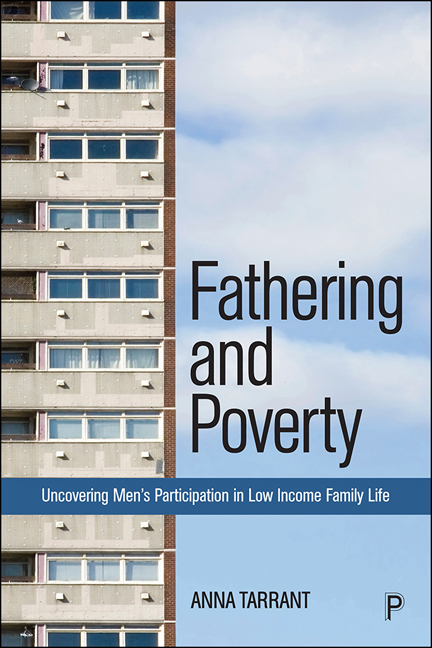Book contents
- Frontmatter
- Dedication
- Contents
- List of figures and tables
- List of abbreviations
- About the author
- Acknowledgements
- 1 Introduction: Fathering, poverty, families and policy
- 2 Low-income fatherhoods in historical and political context
- 3 Theorising men’s participation in low-income families
- 4 Supporting men in low-income contexts: practitioner observations
- 5 Men’s caring arrangements and family trajectories
- 6 Familial economic circumstances and provisioning practices
- 7 Men’s family participation in low-income urban neighbourhoods
- 8 Conclusion: Men’s family participation in low-income contexts
- Appendix A Participant information
- Appendix B ‘Existing evidence’ document shared at the knowledgeexchange workshop
- Notes
- References
- Index
5 - Men’s caring arrangements and family trajectories
Published online by Cambridge University Press: 30 April 2022
- Frontmatter
- Dedication
- Contents
- List of figures and tables
- List of abbreviations
- About the author
- Acknowledgements
- 1 Introduction: Fathering, poverty, families and policy
- 2 Low-income fatherhoods in historical and political context
- 3 Theorising men’s participation in low-income families
- 4 Supporting men in low-income contexts: practitioner observations
- 5 Men’s caring arrangements and family trajectories
- 6 Familial economic circumstances and provisioning practices
- 7 Men’s family participation in low-income urban neighbourhoods
- 8 Conclusion: Men’s family participation in low-income contexts
- Appendix A Participant information
- Appendix B ‘Existing evidence’ document shared at the knowledgeexchange workshop
- Notes
- References
- Index
Summary
This chapter is the first of three that present analyses of men's accounts of their family participation and care trajectories. It explores the questions of how and in which ways men participate in their families in low-income contexts and foregrounds their diverse caring arrangements and family configurations and trajectories. An in-depth examination is presented of the diverse and divergent sets of caring arrangements described by men in different generational positions, drawing on empirical examples across the cases. The findings in this chapter demonstrate how caring arrangements in low-income families are both negotiated and contested over time. This includes across familial generations, between men and women and often in engagements with services and agencies external to families. Attention to these caring arrangements reveals how gendered and classed inequalities are reproduced within family practices, personal relationships and intergenerationally, sometimes requiring men to reassert their right to their families.
The dynamic processes and family trajectories of both the participants and their family members, which determined how the men's caring arrangements came to be, are also explored. Such processes are revealing of the social and relational character of men's caring arrangements in low-income contexts and of the circumstances and personal biographies that required these men to respond to and meet the support needs of their younger family members. Consideration of how the participants narrate their care responsibilities, caring masculinities and the family structures that produce them renders visible the diverse, relational pathways that characterise men's family participation in low-income family contexts across the lifecourse.
The vulnerable family contexts and caregiving arrangements that men manage and negotiate in low-income families also foreground often ignored forms of socially marginalised fatherhoods. These also happen to be fatherhoods that occur in contexts where men's ability to balance their earning capacities with family care are perhaps most subject to compromise or challenge (see O’Brien, 2011). Here, the often hidden and untapped potential of men's family participation in low-income contexts gains precedence.
Diverse caring arrangements
Reflecting the complexity and diversity of contemporary family forms and biographies, MPLC uncovered a varied set of caring arrangements and family configurations. Many of the family configurations described by the participants have been conceptualised as being those most likely to increase vulnerability to poverty (for example, Kelly and Daly, 2015; Mynarska et al, 2015; see also Chapter 3; Appendix 1).
- Type
- Chapter
- Information
- Fathering and PovertyUncovering Men's Participation in Low-Income Family Life, pp. 101 - 126Publisher: Bristol University PressPrint publication year: 2021

